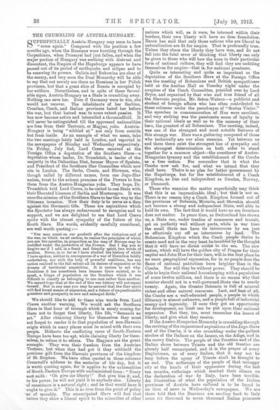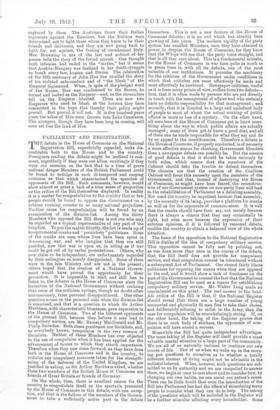THE CRUMBLING OF AUSTRIA-HUNGARY.
SUPERFICIALLY Austria-Hungary may seem to have " come again." Compared with the position a few months ago, when the Russians were bursting through the Carpathians, when Przemysl had just fallen, and when the major portion of Hungary was seething with distrust and discontent, the Empire of the Hapsburgs appears to have passed out of its period of earthquake and eclipse and to be renewing its powers. Galicia and Bukowina are clear of the enemy, and very soon the Dual Monarchy will be able to say that not merely are there no Russians in her Polish provinces, but that a great slice of Russia is occupied by her soldiers. Nevertheless, and in spite of these favour- able signs, Austria-Hungary as a State is crumbling away. Nothing can save her. Even if Germany were to win, she would not recover. The inhabitants of her Serbian, Croatian, Czech, and Italian provinces hated her before the war, but that hatred was to some extent passive. It has now become active and intensified a thousandfold. It will never be extinguished till the oppressed nationalities are free from their Teutonic, or Magyar, yoke. Austria- Hungary is being " nibbled at " not only from outside but from inside. As an example of what we mean, take the two meetings lately held in London, and reported in the newspapers of Monday and Wednesday respectively. On Friday, July 2nd, Lord Crewe received at the Foreign Office a deputation of the Southern Slays—a deputation whose leader, Dr. Trumbitch, is leader of the majority in the Dalmatian Diet, former Mayor of Splints', and President of the Southern Slav Committee which now sits in London. The Serbs, Croats, and Slovenes, who, though called by different names, form one Jugo-Slav nation, trust to the solemn promises of the Powers to free them from the Austro-Hungarian yoke. They hope, Dr. Trumbitch told Lord Crewe, to be united in one State with their liberated kinsmen of Serbia and Montenegro. It was once the mission of the Southern Slays to bar the way to the Ottoman invasion. Now their duty is to serve as a dam against the Germanic tide. These are aspirations which the Spectator has always endeavoured to recognize and to support, and we are delighted to see that Lord Crewe spoke with the utmost sympathy of the future of the South Slays. His words, evidently carefully considered, are well worth quoting :- "You may count on our goodwill after the victorious end of the war, on which we all reckon, to realize the principles of which you are the apostles, in proportion as the map of Europe may be rectified under the protection of the Powers. But I beg you to forgive sue if I add, in a frank and friendly spirit, two words of caution. Never, in so far as I have studied the history of which I have spoken, neither in consequence of a war of liberation boldly undertaken, nor with the help of powerful coalitions, has any nation realized to the full extent all its desires of expansion or its dreams of territorial acquisition, It is useless to ask why, Doubtless it has sometimes been because there existed, so to speak, a. fringe of population on the frontiers which it was difficult to classify as belonging to one race rather than another. We cannot hope that at the end of this war history will not repeat herself. But in any case you may be assured that the Slav spirit will find broad means of expansion, and a future of unquestionable grandeur and prosperity in new and enlarged fields."
We should like to add to these wise words from Lord Crewe another warning. We would ask the Southern Slays in that hour of triumph which is surely coming for them not to forget that liberty, like life, " demands an art." After obtaining liberty for themselves they must not forget to render it to that population of non-Slavonic origin which in many places must be mixed with their own people. Hitherto the conflicting races of South-Eastern Europe have been too apt, while claiming liberty for them- selves, to refuse it to others. The Magyars are the great example. They won their freedom from the Austrian Teutons, but when they had got it they withheld the precious gift from the Slavonic provinces of the kingdom of St. Stephen. We have often quoted in those columns Cromwell's address to the sectaries of his day, but it is worth quoting again, for it applies to the nationalities of South-Eastern Europe with undiminished force : " Every sect saith : ' Oh give me liberty ! ' But give him it, and, to his power, he will not yield it to anybody else. Liberty of conscience is a natural right ; and he that would have it ought to give it." This is as true from the point of policy `as of morality. The emancipated Slays will find that unless they show a liberal spirit to the minorities of other nations which will, as it were, be interned within their borders, their own liberty will have no firm foundation. Bacon has said that only those nations who are liberal in naturalization are fit for empire. That is profoundly true. Unless they share the liberty they have won, and do not fall into the fatal error of thinking that liberty can only be given to those who will bow the knee to their particular form of national culture, they will find they are unfitting themselves for empire—that is, for national greatness. Quite as interesting and quite as important as the deputation of the Southern Slays at the Foreign Office was the meeting of Bohemians and British sympathizers held at the Aeolian Hall on Tuesday night under the auspices of the Czech Committee, presided over by Lord. Bryce, and organized by that wise and true friend of all the Slavonic peoples, Mr. Seton-Watson—a publicist and student of foreign affairs who has often contributed to these columns under the pseudonym of " Scotus Viator." The speeches in commemoration of Hus were excellent, and very striking was the passionate sense of loyalty to their national ideals as well as to the memory of their hero, the greatest of all Bohemians. The meeting, indeed, was one of the strangest and most notable features of this strange war. Here was a gathering composed of those who technically are our alien enemies. Yet between us and them there exist the strongest ties of sympathy and the strongest determination on both sides to stand together for a common object—the overthrow of Austro- Hungarian tyranny and the establishment of the Czechs as a free nation. For remember that is what the Czechs now ask for, and what we intend that they shall have. Theirs is no plea for better government by the Hapsburg', but for the establishment of a Czech Kingdom, as free and independent as Sweden, Norway, or Denmark.
Those who examine the matter superficially may think that this is an impracticable ideal ; but that is not so. There is no reason why a Czech Kingdom formed out of the provinces of Bohemia, Moravia, and Slovakia should not become a strong and independent State, well able to bold its own. The fact that it would have no sea frontiers does not matter. In peace time, as Switzerland has shown us, a State can, under treaties of commerce and transit, get on perfectly well without ports, while in war time the small State can have its intercourse by sea just as effectively cut off as intercourse by land. The Bohemiam Kingdom which the Czech people desire to create need not in the very least be troubled by the thought that it will have no direct outlet to the sea. The new nation, which will have the golden city of Prague for their capital and John Hus for their hero, will in the first place be no mare geographical expression, for in no people does the flame of national patriotism burn brighter than in the Czechs. Nor will they be without power. They should be able to begin their national housekeeping with a population of some twelve millions, and there is no reason why that number should not in a well-governed State rise to nearly twenty. Again, the Greater Bohemia is full of mineral riches and other natural resources. Last, and best of all, the Czechs are a well-educated people, a people in which i illiteracy is almost unknown, and a people full of industrial energy and ingenuity. If once they get an opportunity for development, no limit can be put upon their national expansion. But they, too, must remember the lesson of liberty, and give what they receive.
If the Austro-Hungarian Monarchy is crumbling through the reviving of the impassioned aspirations of the Jugo- Slave and of the Czechs, it is also crumbling under the gallant strokes of the Italians on the Isonzo, on the Adige, and in the snowy Stelvio. The people of the Trontino and of the Italian shore between Trieste and the old frontier are already half emancipated, and it is the prayer of every Englishman, as of every Italian, that it may not be long before the agony of Trieste shall be brought to an end. The sufferings of the people of that unhappy city at the hands of their oppressors during the last ten months, sufferings which reached their climax on the declaration of war by Italy, have been terrible. An illustration of what the population of the Italian provinces of Austria have suffered is to' be found in an item of news in Wednesday's newspapers. We are there told that the Russians are sending back to Italy some six thousand to seven thousand Italian prisoners captured by them. The Austrians threw their Italian regiments against the Russians, but the Italians were determined not to fight those whom they knew to be their friends and deliverers, and they are now going back to fight for, not against, the freeing of unredeemed Italy. Mrs. Browning in one of the last and noblest of her poems tells the story of the forced recruit. One thought such infamies had ended in the sixties," but it seems that Austria-Hungary was destined in her death-struggle to break every law, human and Divine. The celebration of the fifth centenary of John Hus has recalled the story of his violated safe-conduct and of the blush " of the Emperor Sigismund. When, in spite of the pledged word of the Kaiser, Hus was condemned to the flames, he turned and looked at the Emperor—and, as the chroniclers tell us, the Emperor blushed. There are now two Emperors who need to blush at the horrors they have committed in the hope that thereby their policy might prevail. But prevail it will not. It is five hundred years since the ashes of Hue were thrown into Lake Constance. The avengers, though they have been long in coming, will soon set free the land of Hus.



































 Previous page
Previous page